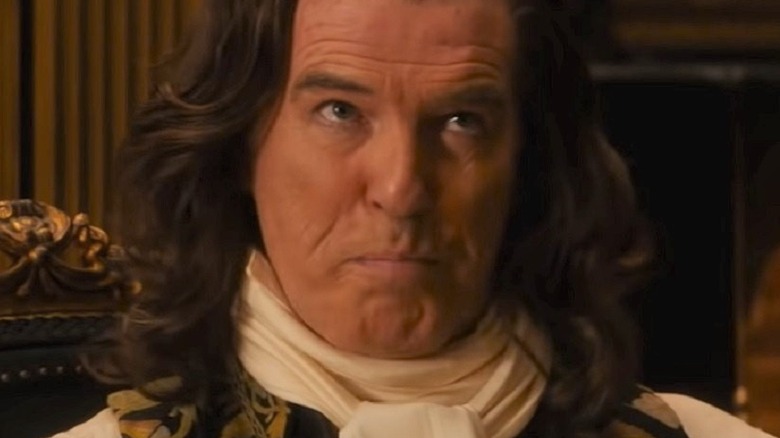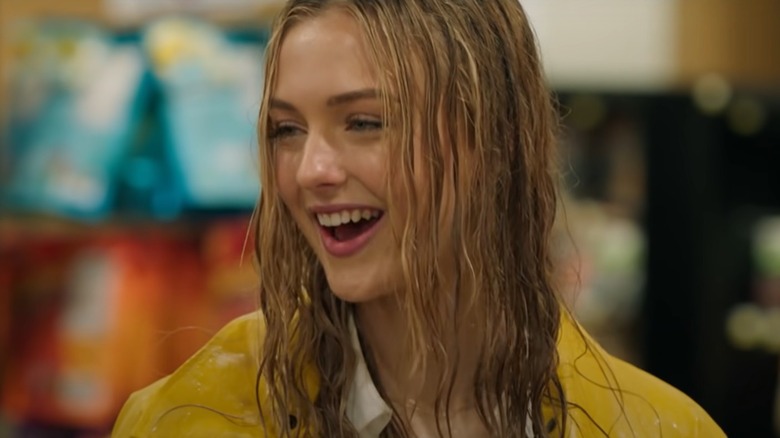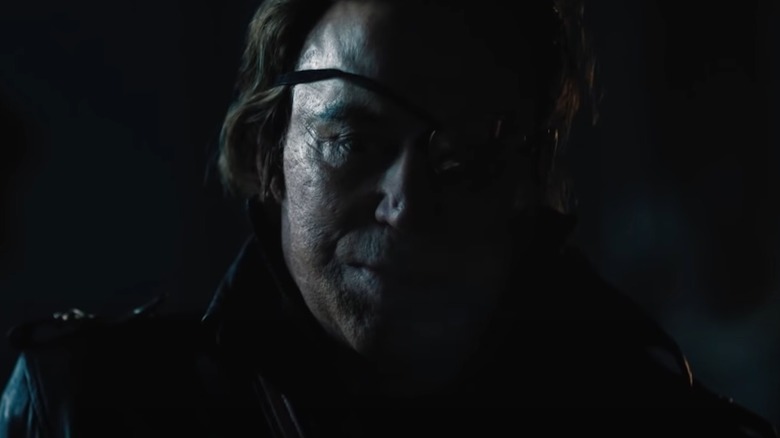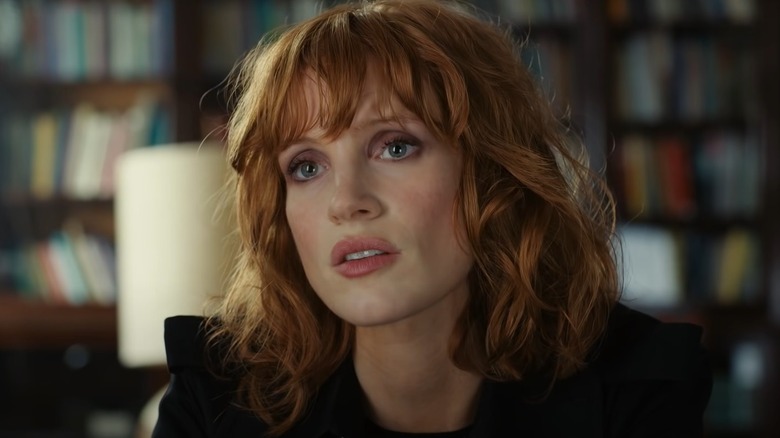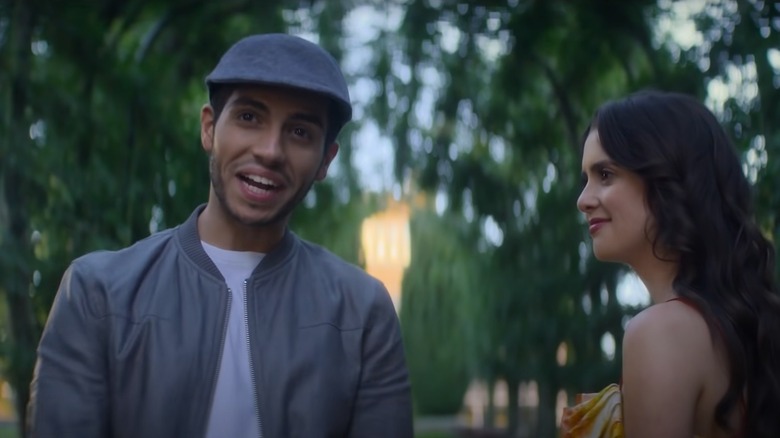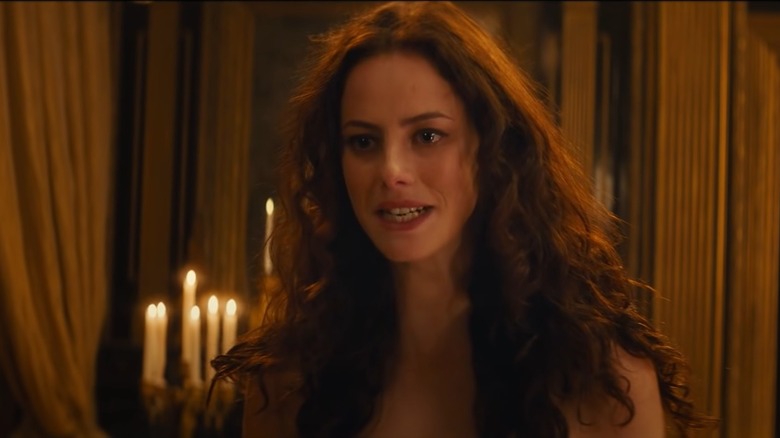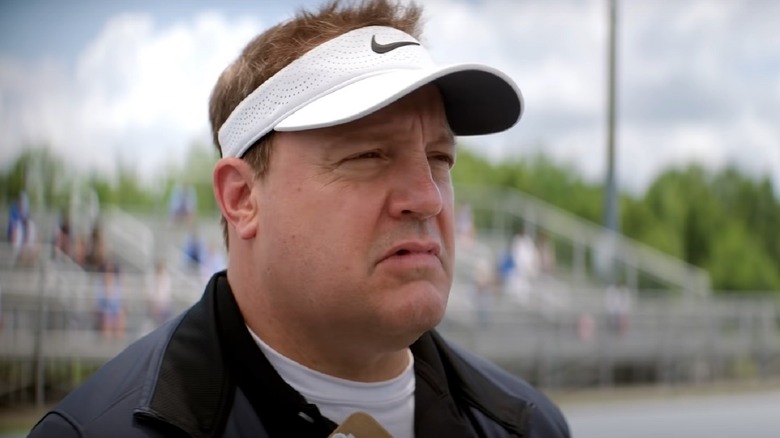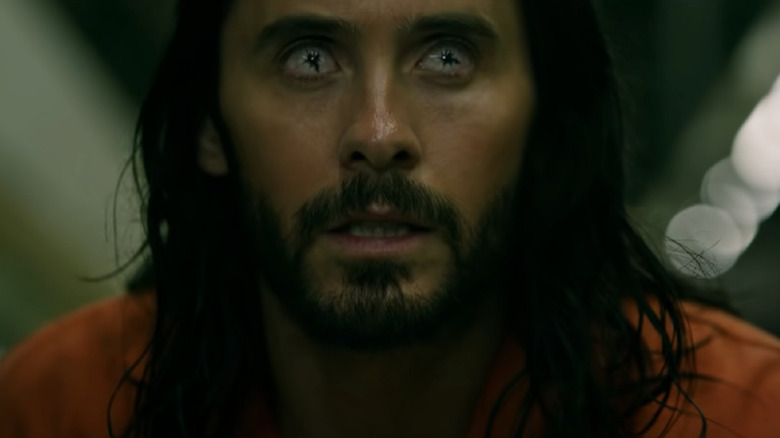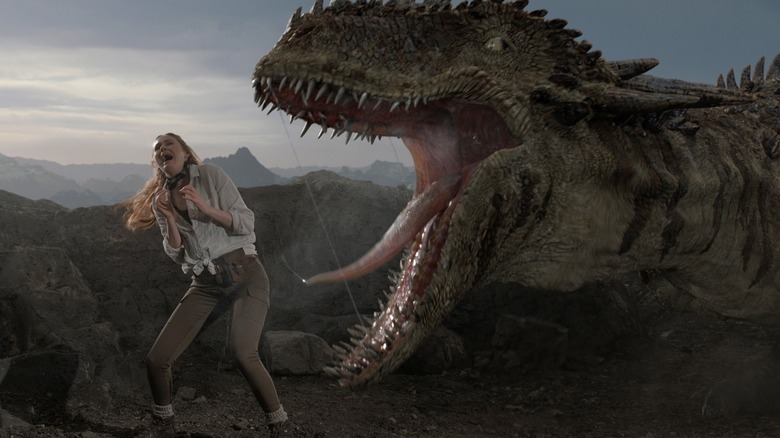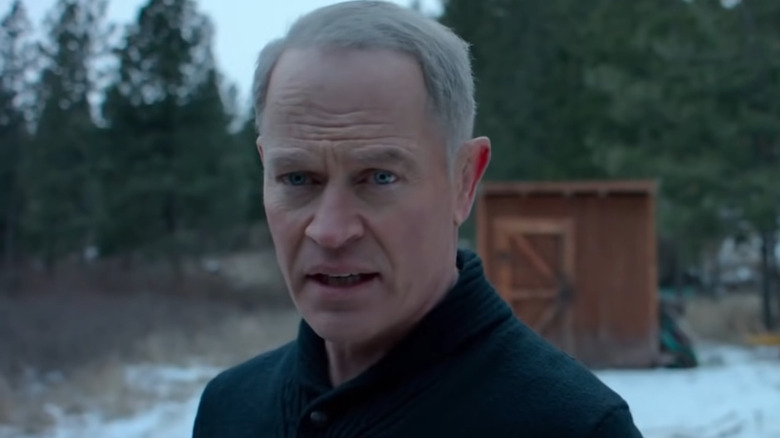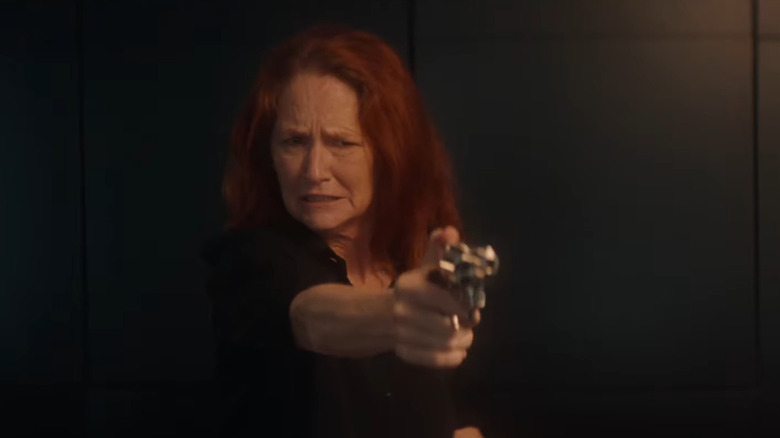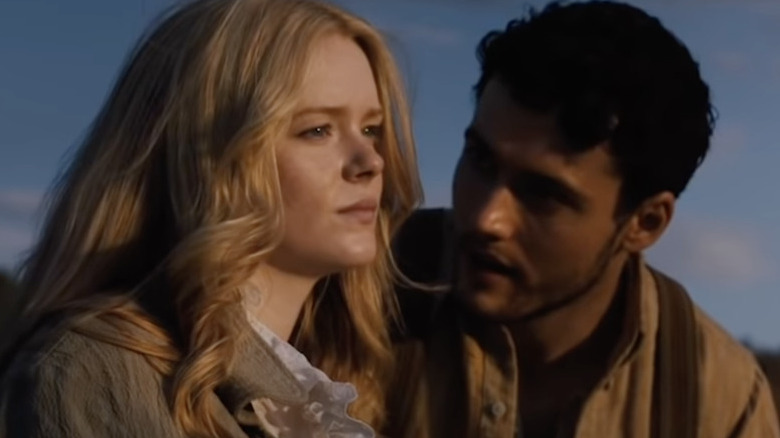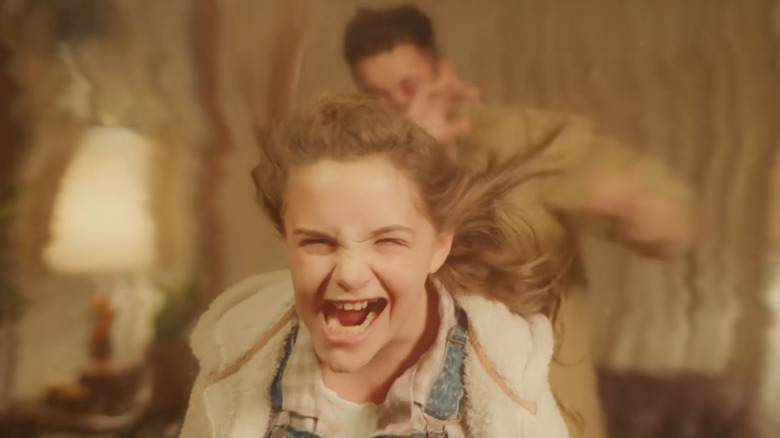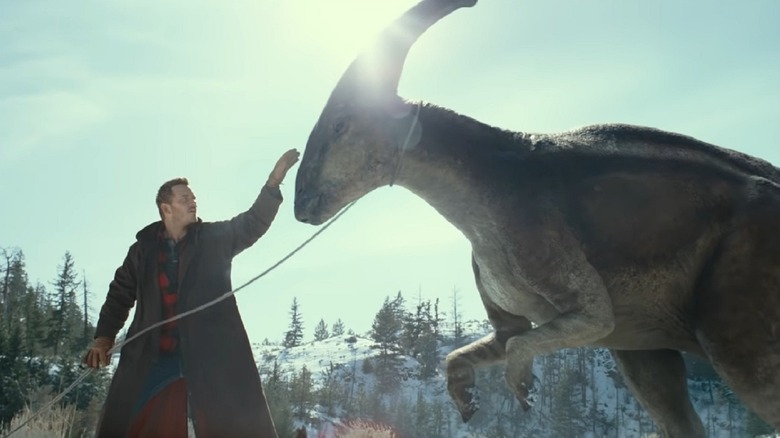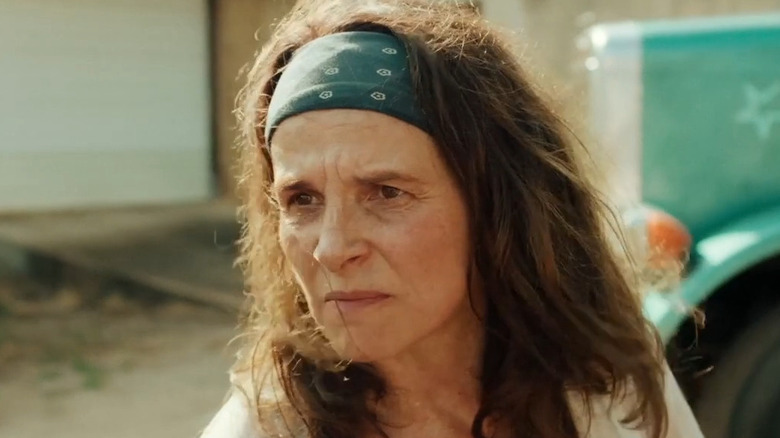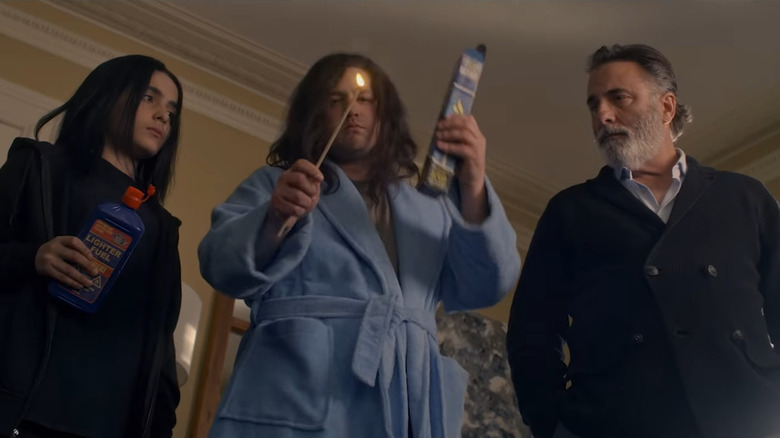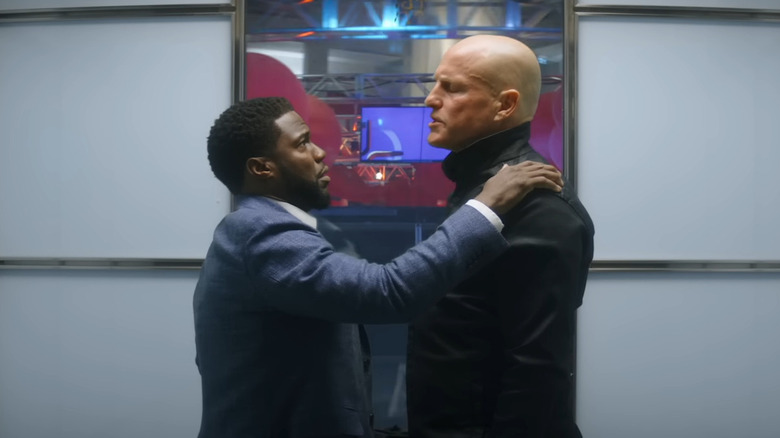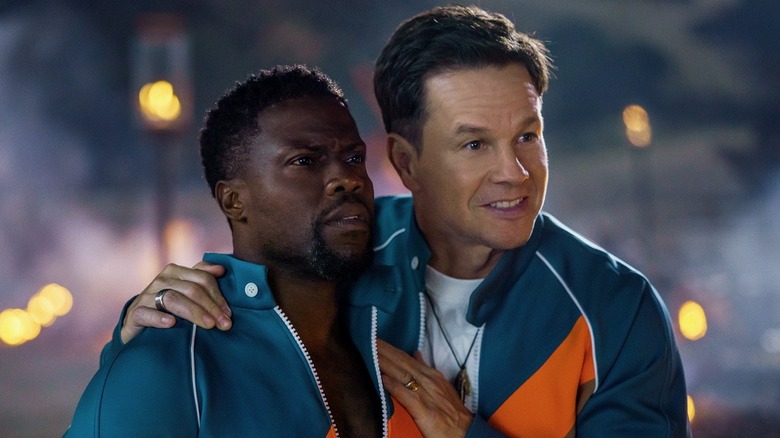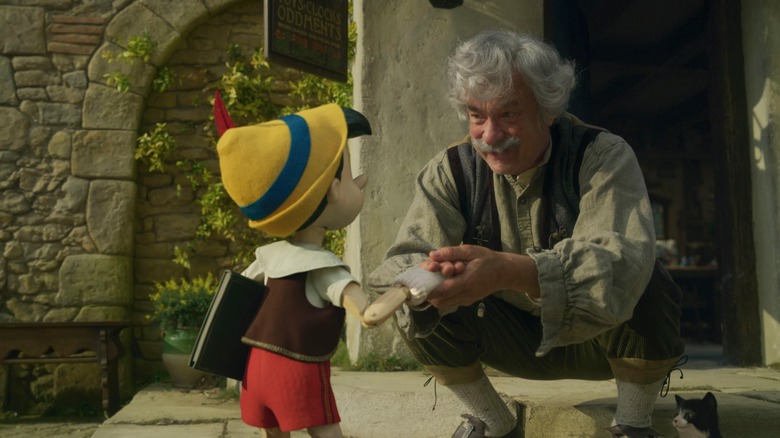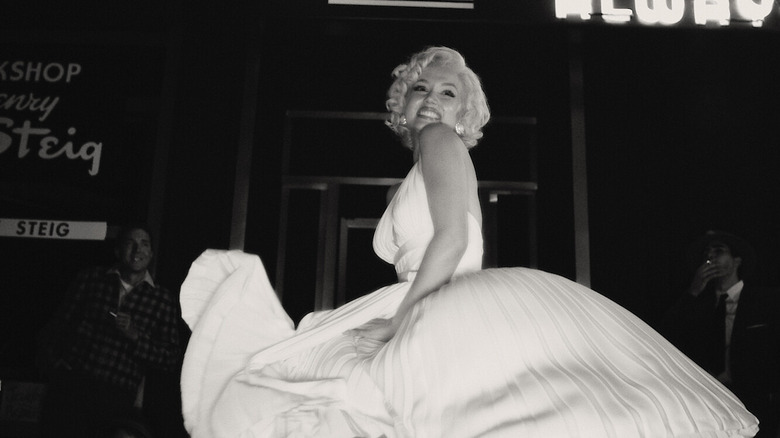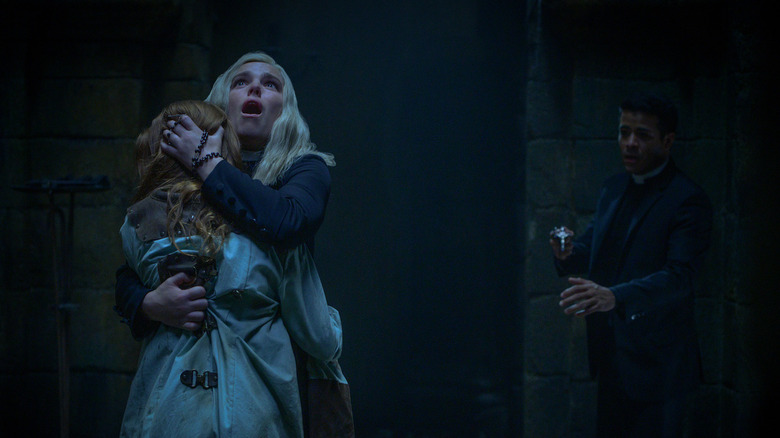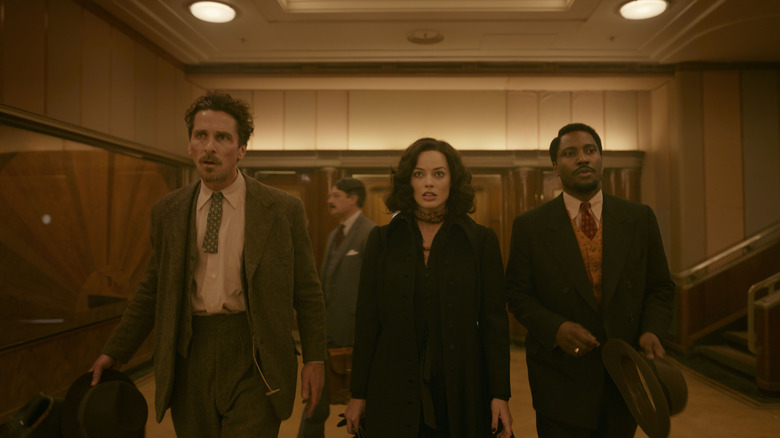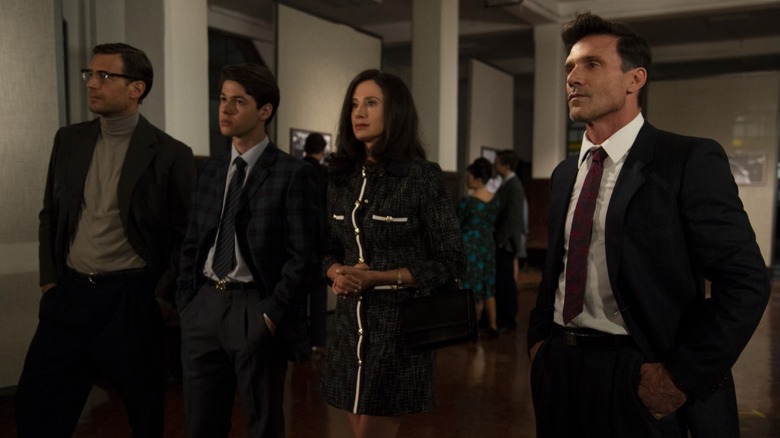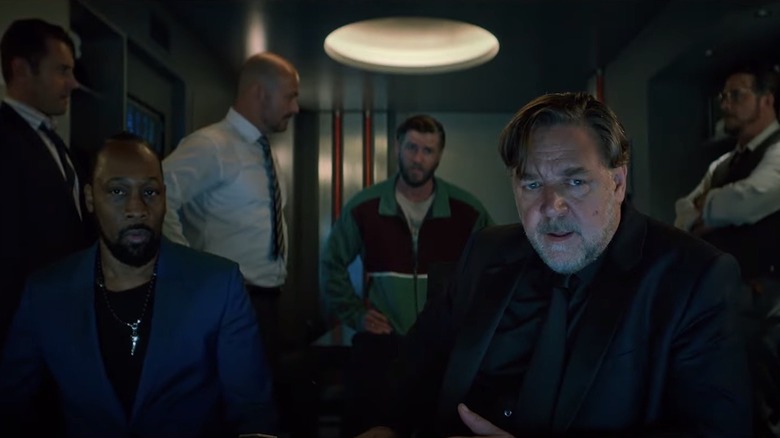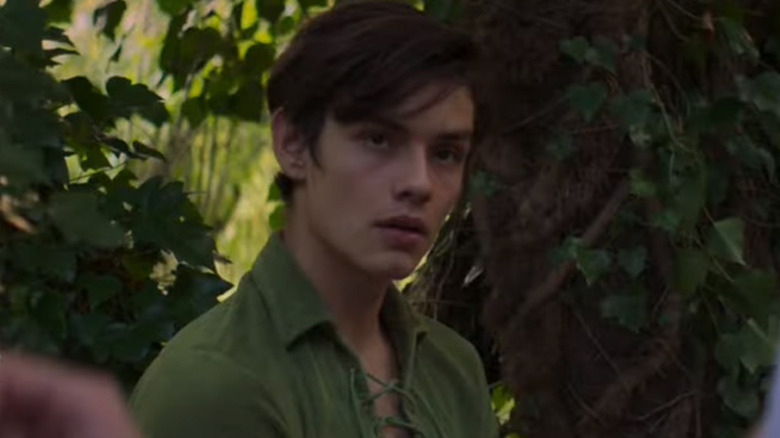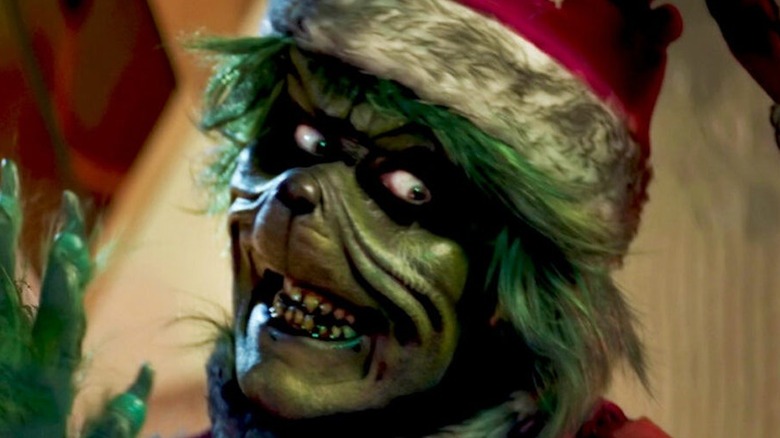The Worst Movies Of 2022
After the coronavirus pandemic shuttered movie theaters around the globe for the better part of 2020 and film fans continued to consume Hollywood's stream of blockbusters and masterpieces alike from the comfort and safety of their homes in 2021, 2022 felt like the year of the cinema comeback. In North America alone, theaters pulled in $15 billion — the most in more than a decade.
That was largely thanks to quintessential moviegoing experiences, films that simply had to be experienced on the largest screen and with the biggest speakers possible, events like "Top Gun: Maverick," and "Avatar: The Way of Water." Smaller, undeniably high quality, artistic, and revelatory films also got people out to the movies in 2022, as "The Banshees of Inisherin," "Everything Everywhere All at Once," and "The Woman King" became cultural high-water marks.
But with all that good comes a lot of bad. Movie studios released a whole lot of films — to theaters and to various home video platforms — in 2022, and they couldn't all be crowd-pleasing mega-hits with something to say about the human condition. Some movies are certified stinkers, and 2022 left in its wake a handful of some of the worst films ever made.
Updated on January 6, 2023: From dreadful comedies to laughable horror flicks, here are the most spectacularly bad movies of 2022.
Shattered
An erotic thriller in the vein of "Fatal Attraction" and "Basic Instinct" but with none of the verve, Luis Prieto's "Shattered" stars Cameron Monaghan (Joker from "Gotham") as Chris, a recently divorced, super-wealthy tech mogul who falls for a sexy stranger in a grocery store. Beautiful, funny, kind, Sky (Lilly Krug) is just too perfect. We can see that pretty much instantly, but Chris, despite his supposedly brilliant mind, cannot. You could argue that he's blinded by her charms, but the sad truth is that the film is just poorly written, and the efforts of the ever-watchable John Malkovich (who plays Sky's sleazy landlord) are not enough to rescue it.
When Chris gets targeted in a seemingly random attack and ends up with a broken (or shattered, wink, wink) leg, Sky becomes his live-in nurse. By the time she's revealed as an unhinged home invader who's only interested in Chris for his money, we're already bored. The sex scenes that were meant to keep us entertained up until this point aren't as steamy as advertised (Austin Chronicle called Prieto's film "the smooth-crotched erotic thriller equivalent of banging a G.I. Joe and a Barbie together"), with little to no spark existing between the co-stars. That's largely down to Monaghan's millionaire being so bland and wooden that we're almost rooting for Sky once the violence starts. Krug is the best part of the movie, but she's forced to dial the craziness up to near-ridiculous levels to counteract her mannequin-like co-star.
Warhunt
A World War II flick with witches and an eye-patch-wearing Mickey Rourke, "Warhunt" shows some early promise before quickly descending into schlocky B-movie territory. It follows a group of U.S. soldiers on a mission behind enemy lines. When an American cargo plane goes down in Germany's Black Forest, Rourke's Major Johnson puts together a team of his best men (led by Robert Knepper, who played Theodore "T-Bag" Bagwell in "Prison Break," and Monroe Jackson Rathbone V, best known for playing pasty-skinned vampire Jasper Hale in "The Twilight Saga") and sends them to retrieve the precious cargo. When the group gets close to the crash site, they discover the bodies of several dead Nazis baring mysterious symbols, and when their compasses suddenly fail, they start to suspect that supernatural forces are at work. Spoiler alert: There's a coven of witches living in the forest.
It's an interesting setup, but writer-director Mauro Borrelli was apparently too busy with visuals to develop any of his characters beyond macho stereotypes. Borrelli is best known for his concept art, having worked on the likes of "Captain America: The First Avenger," "The Hateful Eight," and "Star Wars: Episode VIII – The Last Jedi." It's no surprise then that "Warhunt" looks slick, though it's also completely devoid of fresh ideas. Awful one-liners begin to pile up (Brewer tells Johnson that his guns "ain't violins, even though they make sweet music" in one cringe-worthy exchange), and the goodwill Borrelli built up in the opening stages is rapidly lost.
The 355
Helmed by longtime "X-Men" writer/producer turned director Simon Kinberg, "The 355" is one of those films that really ought to have been much better than it was. This globetrotting spy flick is forward-thinking and features some top talent from around the world, but none of them can elevate "The 355" above the level of generic thriller. In fact, the presence of the likes of Jessica Chastain and Lupita Nyong'o makes the lack of thrills all the more disappointing. As for the plot, Chastain stars as Mason "Mace" Brown, a no-nonsense CIA agent who has to team up with female spies from around the globe to stop a sought-after decryption drive capable of hacking any system on Earth from falling into the wrong hands.
Chastain floated the idea of collaborating on the film while working with Kinberg on "X-Men: Dark Phoenix," the filmmaker (who made his directorial debut on the widely panned superhero flick) told IGN. "She brought it to me, and she said, 'I really want to do a female ensemble spy movie,'" he said, adding, "I love spy films." The critics did not love Kinberg's spy film, however. With such a stacked cast (Lupita Nyong'o, Penélope Cruz, Diane Kruger, and Fan Bingbing all play agents), how did "The 355" fail? The idea was a good one, it was just executed very poorly, from the clunky dialogue to the abundance of played-out action thriller cliches. "The 355" is a waste of talent and a waste of your time.
The Royal Treatment
He rose to fame playing a fake prince in Disney's live-action remake of its classic animated feature "Aladdin," but Mena Massoud portrays a real prince in "The Royal Treatment," a formulaic and forgettable Netflix rom-com. Massoud co-stars as Prince Thomas of the (entirely made up) country of Lavania. He lives in a castle and has his every need attended to, though he's just a normal guy underneath it all (because rom-com). He ends up meeting hairdresser Izzy (former Disney Channel star Laura Marano) after his assistant accidentally calls her salon and hires her for a one-off haircut. Of course, it becomes more than a one-off.
Izzy leaves the prince's hair half-finished after witnessing a member of the royal staff being treated poorly, and he's forced to seek her out so she can finish it. It sounds romantic, but there's no spark here, and the "com" part of rom-com is missing too. "The Royal Treatment" is a humorless and tedious affair from start to finish, and critics lined up to trash it. "A deliberately, almost defensively, inane trifle — a cupcake whose icing reads, 'Enjoy the tooth decay,'" said The New York Times, while the Associated Press dubbed it "a drug store chocolate bar" in a scathing review. Even if you're obsessed with royal romances, there are several better options on Netflix: 2018's "A Christmas Prince: The Royal Wedding" is far from a classic, but it's "Citizen Kane" compared to this glorified Lifetime movie.
The King's Daughter
A historical fantasy that spent years in production hell, "The King's Daughter" stars Pierce Brosnan as King Louis XIV of France, who sends his men to search for a mythical mermaid (Fan Bingbing). Louis wants to live forever, and he believes the magical properties of the mermaid will make that happen. His plan gets derailed when his illegitimate daughter (Kaya Scodelario) learns of the mermaid's existence. This isn't one of those films that's so bad it's good; it's just straight-up bad. And we mean bad. January has long been a dumping ground for unwatchable movies, but "The King's Daughter" was just too terrible to fly under the radar, despite being based on a prize-winning novel.
"The King's Daughter" is an adaptation of Vonda N. McIntyre's "The Moon and the Sun," which won the Nebula Award in 1997. It's a fantastic read, but the movie does the book a huge disservice. Paramount removed the film from its release schedule just weeks before it was due to hit cinemas in 2015, with no explanation. A source close to the production told The Hollywood Reporter that the delay was due to the visual effects being incomplete and that the movie would drop in a few months. However, years would pass before it saw the light of day, and when that eventually happened, it was easy to see why it was hidden away for so long. Both Brosnan and Scodelario chew the scenery as the film meanders to an unsatisfying finish.
Home Team
Following the fashion of the Happy Madison-Netflix films before it, the Kevin James-led "Home Team" falls far short of funny. This gross-out sports comedy is loosely based on the real-life story of football coach Sean Payton, who became the new offensive coordinator of his son's sixth grade team during his one-year suspension from the NFL. It's a fascinating story, but "Home Team" isn't particularly interested in the nitty-gritty — this is a PG comedy starring a bunch of kids, after all. Nobody can really blame co-writers Chris Titone and Keith Blum for seeing the funny side of a famous football coach taking over a junior team, but their script lacks any true laugh-out-loud moments, and fails to capitalize on the potential of Payton's unlikely saga.
Kevin James plays Sean Payton as a permanently scowling man's man who knows next to nothing about his son. But that shouldn't come as much of a surprise to those who have seen their fair share of Adam Sandler-produced films. "The facts have been rejiggered ... to fit the Sandman's formula: Our hero is a seething screw-up, and everyone else is even worse," said The New York Times. Variety called the film "a checklist of scenes and tropes required from a Sandler-backed sports comedy, from half-hearted background pratfalls to extraneous comic-relief sideshows." We're not mad at "Home Team," we're just disappointed. In the right hands, it could have been a touchdown, but this lazy comedy isn't worth your time.
Morbius
Thanks to an agreement put in place before Disney's Marvel Cinematic Universe took off, Sony controls the film rights to a number of lesser-known characters from the Spider-Man canon. Sony's Spider-Man Universe has included the financially successful and critically moderately received "Venom" and "Venom: Let There Be Carnage. And in 2022, the latest entry, "Morbius" hit theaters ... earning some of the worst reviews for a film based on a comics property in more than a decade.
An origin story of the titular "Living Vampire," "Morbius" stars Jared Leto as Michael Morbius, a scientist who cures himself of a blood disorder with an experimental treatment of his own design. Of course, he also accidentally makes himself a very special vampire, one who feasts on the blood of humans but who also has superpowers, which fuel his epic battle for the ages against Milo Morbius (Matt Smith), his surrogate brother who has the same blood disease, contracts the same powers, but becomes the evil vampire counterpart to Michael's good guy (but still totally dark, spooky, and tormented) vampire.
According to professional film critics, "Morbius" is the worst film yet in Sony's Spider-Man-adjacent cinematic universe, scoring a lowly 16% on Rotten Tomatoes. Mark Kennedy of the Associated Press called it "forgettable, often laughable" and a "poorly edited, derivative time suck," and James Berardinelli of ReelViews found it "a chore to sit through," a film devoid of "imagination, zest, and a thrill of discovery."
The Bubble
Perhaps the world just isn't ready to laugh at the collective trauma that was the COVID-19 pandemic and its related mass lockdowns, social isolation, and widespread fear. "The Bubble" marks a major misfire for iconic comedy filmmaker Judd Apatow, creator or curator of such touchstones as "Knocked Up," "Freaks and Geeks," "The 40-Year-Old Virgin" and "The King of Staten Island." "The Bubble" is about the chaotic production of "Cliff Beasts 6: Battle for Everest: Memories of a Requiem," a crummy blockbuster franchise movie shooting during COVID-19 lockdowns, which requires the cast of spoiled stars to stay in their rooms, act against green screens, and endure health protocols, all of which they snottily bristle against and resist. It causes major headaches for the filmmakers and the cynical hotel staff alike.
"The Bubble" is a certifiable dud with a paltry 22% rating on Rotten Tomatoes. Perhaps its biggest sin is that despite one of the most formidable casts of comedically skilled actors ever assembled (including Karen Gillan, Leslie Mann, Fred Armisen, David Duchovny, Keegan-Michael Key, Kate McKinnon, Peter Serafinowicz, Maria Bamford, Rob Delaney), "The Bubble" doesn't provide enough laughs. "A movie so staggeringly unfunny as to be barely recognizable as comedy at all," wrote Jessica Kiang of the Los Angeles Times. Katie Rifle of Polygon compared "The Bubble" to "people trying to start a fire by rubbing two wet sticks together," as the movie is "composed mainly of long, excruciating sequences where everyone is trying very hard and producing zero laughs."
Boon
"Boon" is like a Charles Bronson vigilante movie from the '70s but without the cultural context, bewildering urban setting, or extreme violence, that — for better or worse — make those compelling and unique. It's also a "middle-aged guy gets revenge on bad guys" flick in the late-career Liam Neeson vein but without the charisma, star power, or grizzled slow burn of Neeson.
Instead, "Boon" is about a hired gun named Nick Boon (played by TV cop show veteran Neal McDonough), who's seeking redemption after a long, emotionally, and psychologically toxic career as the muscle and hired killer for a criminal organization. So, he moves to a remote town in the Pacific Northwest and takes up with a nobly poor widow and her young son. But Boon realizes his new life is much like his old one when a crime lord exploits and terrorizes his new family, so he'll have to violently make things right with the world.
While less than 10 critics could even be persuaded to hit through "Boon," they all universally loathed the film, bestowing it with the rare and dubious 0% rating on Rotten Tomatoes. "When the budget is this low and the star power this minimal, it's best to go crazy with action, which this picture tries to avoid until the final act," said Brian Orndorf of Blu-ray.com.
Measure of Revenge
The makers of "Measure of Revenge" seemed to be motivated by a desire to craft a film as seedy as possible but without the high stakes, quirky characters, or daring plot necessary that can justify the descent into the grimier parts of human existence. Instead, the film is a dark by-the-numbers revenge fantasy about a mismatched pair of antiheroes, where the most interesting parts of the film are the wild shifts in imagery and mood.
Oscar winner Melissa Leo plays Lillian Cooper, a legendary Broadway actress about to retire whose son is found dead, his demise attributed to an accidental drug overdose. Not quite believing that her grown, troubled son would die in such a manner, Lillian becomes a vigilante, a one-woman, mystery-solving, criminal-punishing army, which doubles in size when she forms a strange partnership with Taz (Bella Thorne), her son's drug dealer who may have all the answers.
"Everything about this bomb is inexplicably odd," writes Rex Reed of The Observer, "from the plot to the camerawork to the fact that there is no credit for screenplay." Michael Nordine of Variety writes that the presence of the illustrious Leo is unnerving. "Viewers are likely to spend more time wondering how she came to be involved with such a shoestring production than sympathizing with her character."
Redeeming Love
"Redeeming Love," directed by the usually capable D.J. Caruso of "Disturbia" and "xXx: Return of Xander Cage," demonstrates that it's difficult to make a morally uplifting movie about a time and place intrinsically associated with debauchery and misdeeds without causing emotional and tonal whiplash.
Set in a California Gold Rush boomtown in 1850, the film focuses on the on-the-nose-named Angel (Abigail Cowen), a young woman sold to bad men when she was a child and who grows up to be a sex worker against her will. She internalizes the abuse and is riddled with self-hatred until the good, righteous, morally upstanding Michael (Tom Lewis) appears and shows Angel that a little bit of love and attention can apparently heal any and all deep psychological wounds and make all the trauma one has experienced on a daily basis for years just melt away. In other words, "Redeeming Love" is literally and awkwardly a movie about redeeming love.
With a 12% tally on Rotten Tomatoes, critics were not moved by "Redeeming Love," which they found more emotionally manipulative than profound. The film "fails as both a compelling romance and an effective drama, failing to do its dazzling leading lady — or anyone else — justice whatsoever," said Jade Budowski of Decider.
Firestarter
The original "Firestarter" (starring Drew Barrymore as the titular character) hit theaters in 1984, earned a middling $17 million and so-so critical reviews, and then it disappeared into the ether. But in 2022, horror master Jason Blum and Oscar winner Akiva Goldsman supervised a remake of this mediocre adaptation of a lesser work from bestselling author Stephen King.
The film tells the story of parents (Zac Efron, Sydney Lemmon) dealing with their 10-year-old daughter Charlie (Ryan Kiera Armstrong), who, as the result of evil government experimentation, has the ability to start fires with her mind. They've successfully spent their lives on the lam from the government agents who wish to capture Charlie and weaponize her powers, and the firestarter has been able to keep her firestarting in check ... but not so much anymore. That will prove a valuable (but tragic) asset when the government steps up its drive to steal Charlie away from her doting mom and dad.
With a 13% score on Rotten Tomatoes, it's clear that critics thought the new "Firestarter" wasn't just unnecessary but unequivocally terrible too, with critics throwing around words like "dull," "corny," and "cringeworthy." "The only mood conjured by this dud is one of extreme torpor," wrote Nick Schager of The Daily Beast, while Katie Rife of Polygon quipped that "Firestarter" is "pretty okay when no one is talking."
Jurassic World Dominion
The sixth movie in the "Jurassic Park" series and the third entry in the reboot trilogy launched in 2015 with "Jurassic World," "Jurassic World Dominion" feels designed to gobble up money the way its unhinged dinosaurs gobble up prey. But it would seem that filmmakers have returned to the formula one too many times to make a decent movie, even one that features hyper-realistic dinos and likable movie stars like Chris Pratt and Bryce Dallas Howard, along with the nostalgic return of original 1993 "Jurassic Park" stars Sam Neill, Laura Dern, and Jeff Goldblum.
Set four years after the events of "Jurassic World: Fallen Kingdom," dinosaurs now roam the world, terrorizing and hunting humans and other creatures, shooting themselves to the top of the food chain. So it's too bad the movie decides to spend a good chunk of its run time focused on an outbreak of giant locusts. Yep, that's right. In a movie where dinosaurs are running around Malta, the movie decides to talk about really big bugs — which is an, uh, "interesting" choice, to say the least.
Of course, that's not the only problem with this sequel. According to Rotten Tomatoes, "Dominion" is by far the most critically savaged trip to the "Jurassic" lands yet, amassing a woeful 30% rating. "The last time dinosaurs were subjected to a disaster this bad, there was an asteroid involved," quipped critic Tim Brayton of Alternate Ending, while many film writers were just bored and questioned the reason for the existence of yet another "Jurassic World" movie. "Ho hum," said Mark Kermode of The Observer, while Adam Nayman of The Ringer found the film "overly long and soullessly engineered."
Paradise Highway
After some promising short films, Anna Gutto made her feature screenwriting and directorial debut with "Paradise Highway." One couldn't ask for a better cast for their first big movie, as it stars likable action mainstay Frank Grillo and two Academy Award winners in the legendary Morgan Freeman and Juliette Binoche. The problem is, this talent is woefully miscast. In order to save her brother (Grillo) from peril, Southern trucker Sally (Binoche) is forced to transport illegal cargo, which turns out to be a little kid. Grillo isn't in the movie much, existing primarily as a disembodied voice on one end of a phone line. Binoche just isn't believable as a tough, foul-mouthed woman of the road. Freeman, despite being well over 80 years old, plays a hard-as-nails FBI agent.
"Paradise Highway" also suffers from a lurid plot: It's seedy, salacious for the sake of being salacious, and even exploitative. The story should allow for intensity, but it never comes to pass. The New York Times dinged the movie for a lack of interesting tension. Cinemalogue agreed with this assessment, and further criticized the film as meandering and obvious. Most other critics concurred, as "Paradise Highway" earned a truly dismal Rotten Tomatoes score.
Big Gold Brick
"Big Gold Brick" tells the story of young writer Samuel Liston (Emory Cohen) as he attempts to write the biography of Floyd Deveraux (Andy Garcia), a middle-aged father the film takes great pains to let the viewers know is quirky. Nearly every event in "Big Gold Brick" is a smug contrivance. The tiresomely pretentious Samuel and the obnoxiously weird Floyd meet when the latter hits the former with his car. Samuel is then the audience surrogate into the world of Floyd's family, which "Big Gold Brick" relentlessly insists is wacky and interesting but are really just a third-rate bunch of "Royal Tenenbaums" kooks, like the metalhead who likes gore (Leonidas Castrounis), a supposedly avant-garde musician (Lucy Hale), and a never-busy attorney (Megan Fox), who, unsurprisingly and for no good reason at all, attempts to seduce the writer. And that's just some of the chaos that predictably unfolds.
Critics hated "Big Gold Brick," giving it a lowly 20% rating on Rotten Tomatoes. "Big Gold Brick" looks all right but it truly just sits there," said Nicolas Rapold of The New York Times while David Ehrlich of IndieWire called the film an "endless parade of energy-less moments connected only by the lack of life shared between them."
The Man from Toronto
Kevin Hart has made a lot of movies like "The Man from Toronto" before. He plays a scrappy, fast-talking, kind-of-stupid underdog with something to prove who's forced to team up with a much physically larger and taciturn tough guy who doesn't care for his nonsense as they engage in a series of action-heavy encounters. "The Man from Toronto" is of the same vein but smashed up with a hitman movie and mistaken identity movie in which Woody Harrelson, of the distinctive Southern drawl and laidback screen presence, plays a Canadian contract killer who specializes in torture.
Hart plays a hapless wannabe fitness guru — demonstrated with a series of painful and painfully unfunny slapstick sequences of malfunctioning exercise equipment — opposite Harrelson's sadistic and not-at-all-funny monster of a character. They wind up in the same vacation cabin because Hart's character gets the address wrong, and the Man from Toronto shows up there to kill a guy. And then they're stuck together on the lam, avoiding both extremely violent and bloodthirsty bad guys and the FBI as they jump through various and usual action comedy hoops.
With a 23% Rotten Tomatoes score, critics by and large loathed "The Man from Toronto." Nick Schager of The Daily Beast called it "dreadfully unfunny," while Leigh Paatsch of the Herald Sun found it "simply no good."
Me Time
Kevin Hart has a lot of fans, but in his willingness to give the audience what it wants, he churns out a lot of movies — so many that their quality could be suffering. "Me Time" is Hart's third movie of 2022, and according to Rotten Tomatoes, it's the worst of his career, amassing a paltry 6% rating.
Hart plays his usual screen character — a high-strung, wisecracking, deeply insecure regular guy. This time out, Hart portrays Sonny, a doting dad who feels he's losing his edge and is in need of some time away from his wife and children, just to himself, to do the kind of guy stuff he thinks he likes. And so, when the family is away, Sonny gets to play, calling up his estranged best friend, Huck (Mark Wahlberg), to hang out and have fun, meaning he doesn't really want or ever get the "me time" the title promises.
Wahlberg, who usually plays the uptight guy, relishes the opportunity to be the agent of chaos (and revenge) in a series of cliched, predictable scenarios where everything that can possibly go wrong totally does, in cliched, predictable ways. And then Hart repeatedly overreacts to absurd, implausible dangers. Richard Roeper of the Chicago Sun-Times found "Me Time" to be "stunningly unfunny," while Christy Lemire of FilmWeek said the movie "is so wacky, shticky, and broad, and there is not a single surprise to be had."
Pinocchio
Disney's live-action remakes of its classic animated features have had far from a flawless critical track record. But even the subpar quality of previous outings couldn't have prepared people for the studio's underwhelming new take on "Pinocchio." Helmed by Robert Zemeckis, this 2022 update on "Pinocchio" didn't offer anything to improve on the film it was remaking, instead replacing the complicated tone of the original feature with lifeless CGI and dumb bits of modern comedy. The idea to render this iteration of the little wooden boy as such a passive figure was just one of many baffling concepts in this remake, which also suffered from an overabundance of CGI and a terrible reimagining of Jiminy Cricket (here voiced by Joseph Gordon-Levitt).
Worst of all, this project roped in and wasted the valuable time of Tom Hanks, who was conscripted to play Geppetto. His presence doesn't enliven the film so much as it reminds audiences how every artist assembled here could've spent their time far more wisely. If there's any major upside to this new version of "Pinocchio," it's that it made the stop-motion animated Guillermo del Toro take on this same fairy tale all the easier to appreciate when it dropped a few months later.
Blonde
Andrew Dominik has constantly made movies that get to the dark and recognizably human heart of American legends. "The Assassination of Jesse James by the Coward Robert Ford" was all about rendering its two titular characters as discernibly human creations rather than figures of myth. "Killing Them Softly" expanded its gaze to the very concept of hopefulness in American institutions themselves, with the movie functioning as a grim undercutting of the generally upbeat perceptions of upward mobility in this country. While going this route has worked like gangbusters for Dominik in the past, trying this approach on the life of Marilyn Monroe in "Blonde" creates a feature that's unpleasant in all the wrong ways.
Portrayed here by Ana de Armas, "Blonde" just doesn't offer all that much interesting insight into the psychology of Monroe nor into the factors that made her existence a living hell. Despite featuring an incredibly game and gusto performance from de Armas, "Blonde" rarely gives her much interesting material to work with. Despite featuring conceptually interesting visual flourishes like every-shifting aspect rations and color schemes, "Blonde" isn't even all that compelling in its imagery, with the sharp visual sensibilities of Dominik's earlier works being disappointingly absent here. One would be much better off just revisiting Dominik's high points as an artist in "Killing Them Softly" rather than trudging through the creative stumbles of "Blonde."
Prey for the Devil
Until the end of time, people will be trying to recapture the lighting-in-a-bottle success of "The Exorcist." That horror movie made exorcisms a go-to practice to hinge new films around, though despite the ubiquity of such titles, few have managed to even come close to the quality of "The Exorcist." Even many of the sequels to that William Friedkin horror film have been disappointingly shallow rather than frightening. Unfortunately for moviegoers looking for solid horror cinema, "Prey for the Devil" is yet another forgettable dud in the expansive canon of "Exorcist" knock-offs.
It's no surprise that critics have been heavily disappointed with the meager scares "Prey for the Devil" offers up, with specifical criticism being lobbed at how derivative its atmosphere is of other exorcism movies, as well as a disjointed narrative that's more distracting than eerie. Worst of all are the repeated criticisms that "Prey for the Devil" is, above all else, monotonous rather than memorably bad. The movie's mechanical approach to becoming the "Exorcist" of 2022 means that it's simply tedious — a lifeless rehash of the past, too lacking in a pulse to deliver idiosyncratic shortcomings. One would hope a movie as critically lambasted as "Prey for the Devil" may at least slow down the avalanche of "Exorcist" knock-offs, but sadly, audiences will likely have to endure even more of these kinds of forgettable horror features.
Amsterdam
Writer/director David O. Russell shot for the moon with "Amsterdam," which brought together a staggering ensemble of talent (ranging from Christian Bale to Taylor Swift) to portray the various players in a dark comedy set in the early decades of the 20th century. The whole enterprise is plagued by, among other shortcomings, an inescapable sense of lifelessness, particularly in the cinematography and half-hearted deliveries of seemingly big jokes. It also turns out that bringing together so many famous actors isn't all that compelling if you don't give them something interesting to do. Who cares if Mike Myers and Michael Shannon are rubbing shoulders if they aren't doing anything memorable in their screen time?
The flaws in "Amsterdam" are endless, right down to Christian Bale's performance, which pulls off the hat trick of being both too hammy and severely lacking in a discernible personality. Worst of all, though, is its runtime, which stretches out the movie's thin plot for roughly 135 minutes. There really is no advantage to such a prolonged length beyond making one even more conscious of this feature's various flaws. All of the big names Russell secured for "Amsterdam's" cast may have looked snazzy on a poster, but none of them were able to salvage this startingly empty disaster.
Lamborghini: The Man Behind the Legend
"Lamborghini: The Man Behind the Legend" offers up its take on the life of Ferruccio Lamborghini (Frank Grillo) and specifically his drive to defeat rival Enzo Ferrari (Gabriel Byrne) during the Geneva Grand Prix. "Ford v Ferrari" demonstrated in 2019 that dudes engaging in automobile-focused rivalries can be quite exciting and compelling, but "Lamborghini: The Man Behind the Legend" offered the disastrous flipside to that feature. This title, written and directed by Bobby Moresco, was critically savaged upon its release and largely dismissed as a disposably tedious motion picture.
Top of the list of recurring critiques about the movie is how "Lamborghini: The Man Behind the Legend" doesn't offer much insight or unique perspectives on its central subject. There's nothing in here, either narratively or visually, to make "Lamborghini" stand out from countless other similar biopics. The performances from actors like Frank Grillo gets slightly better marks than other aspects of the production, but even these performers can't keep a film this dismal afloat. Whether you're looking for a movie that offers something new to say about the life of Ferruccio Lamborghini or just an exciting movie about cars, "Lamborghini: The Man Behind the Legend" is bound to leave you disappointed.
Poker Face
In his time as an actor, Russell Crowe has headlined several acclaimed films, including "The Insider," "Gladiator," and "The Nice Guys." Unfortunately, his second feature-length directorial effort, "Poker Face," wasn't greeted with the same level of acclaim. On the contrary, this suspense thriller was met with disdain from critics, who largely found this title to be an utterly forgettable outing. Crowe has often made incredibly bold choices as a performer that, love them or hate them, do ensure his work as an actor sticks around in your mind. By contrast, "Poker Face" has been largely criticized for being so generic.
The most critical flaw highlighted time and time again in the reviews for "Poker Face" is that it's a designed to be a movie that keeps you on the edge of your seat, yet its storyline — involving a group of childhood friends playing a life-or-death card game — and characters are incredibly predictable. Nothing in here is all that innovative nor effective at conjuring up suspense. The mostly listless performances from the supporting cast, which includes Liam Hemsworth (who's supposed Crowe's childhood best friend), also garnered negative marks. As an actor, Crowe's reputation is largely unimpeachable. His skills in that area, though, are sorely missing when it came to his filmmaking chops on "Poker Face."
The Lost Girls
The movie industry never tires of delivering new takes on Peter Pan, the perpetual child dreamed up by writer J.M. Barrie in the early 20th century. Following "Hook," "Pan," "Return to Never Land," the live-action "Peter Pan" and a slew of animated Tinker Bell movies from Disney, comes "The Lost Girls," a 2022 adaptation of Laurie Fox's novel of the same name. Set decades after the original "Peter Pan" story, this flick sees the never-aging title character visit and captivate four successive generations of female Darlings, all of whom descend from Wendy. The family seems to be constantly beset by drama, and all of it is implied to be caused by mental illness and a general disappointment with life. Little can compare to the magical worlds shown to them by the mysterious (and kind of creepy) Peter Pan (Louis Partridge).
Critics were less than enchanted by "The Lost Girls," which accumulated a very poor Rotten Tomatoes score. As Marya E. Gates of RogerEbert.com declared, "'The Lost Girls' should have stayed on the page." Katie Walsh of TheWrap was even more harsh, writing, "It's impossible to connect with these characters or their journey in this inauthentic, airless, and tortuously tangled film."
The Mean One
Whether it's in the form of Dr. Seuss' classic storybook, the beloved TV special, or its many cinematic adaptations, "How the Grinch Stole Christmas!" is a holiday institution. It features a powerful and heartwarming story about a furry green monster who endeavors to ruin Christmas for the town of Whoville, only to enthusiastically embrace the holiday after experiencing the warmth and love of a child. Up until that last-minute twist into sweetness, however, the tale is a gleefully subversive Christmas present about a horrible creature with evil intent. "The Mean One," a horror parody of the celebrated story, takes this portion of the yarn in a very different direction.
"The Mean One" is violent, bloody, and terrifying slasher movie that just barely evades copyright violation. The titular Mean One (David Howard Thornton) – as in, "You're a mean one, Mr. Grinch" — dresses up like Santa and terrorizes a mountain town one Christmas Eve, slaughtering a family in the night. Two decades later, the only survivor, Cindy You-Know-Who (Krystle Martin), returns to the scene of the crime. She aims to ruin Christmas for the Mean One by murdering him.
According to critics, "The Mean One" doesn't really work as a horror movie or a satire. "The Mean One comes without scares, it comes without style," wrote Chad Collins of Dread Central. "It comes without much of anything at all." Vikram Murthi of IndieWire declared, "It's almost as if there was an explicit directive not to crack any jokes, let alone exhibit any pleasure."
